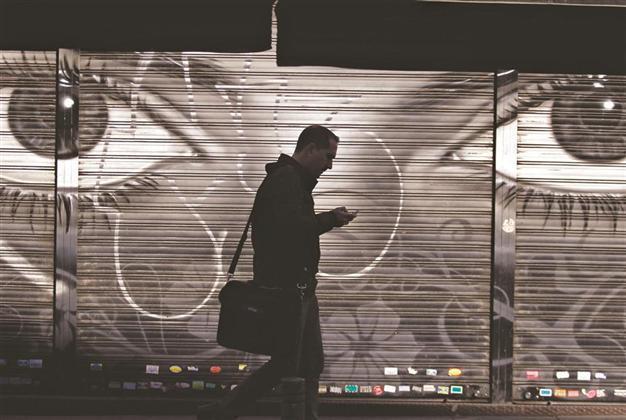Kerry admits spying went too far
WASHINGTON / JAKARTA

A man looks at his cell phone as he walks on the street in downtown Madrid, Thursday, Oct. 31, 2013. US Secretary of State John Kerry gave assurances that such steps, which have roiled close allies like Germany, would not be repeated. AP File Photo
The United States has said in some cases its surveillance program has gone too far, an unprecedented admission in its tense row with Europe over U.S. spying against allies.After 10 days of scandal with key European allies, a statement on Oct. 31 by Secretary of State John Kerry was the first to explicitly acknowledge overstepping by U.S. intelligence.
Kerry justified the surveillance in broad terms, citing the Sept. 11, 2001 attacks in the United States, as well as attacks in London, Madrid and elsewhere to argue that the U.S. and other countries have had to come together to fight “extremism in the world that is hell-bent and determined to try to kill people and blow people up and attack governments.” He said U.S. intelligence has since 2001 averted attacks with intercepts of communications. But he acknowledged, without going into specifics, that at times it has been too much.
Kerry also sought to give assurances that such steps, which have roiled close allies like Germany, would not be repeated. “I assure you, innocent people are not being abused in this process, but there’s an effort to try to gather information,” Kerry told a London conference via video link. “And yes, in some cases, it has reached too far inappropriately.”
“And the president, our president, is determined to try to clarify and make clear for people, and is now doing a thorough review in order that nobody will have the sense of abuse,” he said. Kerry added that what Washington was trying to do was, in a “random way,” find ways of determining if there were threats that needed responding to. “And in some cases, I acknowledge to you, as has the president, that some of these actions have reached too far, and we are going to make sure that does not happen in the future,” he said.
Recent allegations and reports of widespread spying by the U.S. National Security Agency have sparked a major rift in trans-Atlantic ties. Kerry’s remarks came in response to a question addressed to both him and British Foreign Secretary William Hague about government surveillance.
Kerry spent a good portion of his answer justifying the collection of data as necessary due to the threat of terrorism and suggested Washington was not alone in doing so. “Many, many, many parts of the world have been subject to these terrorist attacks,” he said.
“And in response to them, the United States and others came together -- others, I emphasize to you -- and realized that we’re dealing in a new world where people are willing to blow themselves up.” He added: “We have actually prevented airplanes from going down, buildings from being blown up, and people from being assassinated because we’ve been able to learn ahead of time of the plans.” Kerry also lashed out at some of the reporting about alleged spying, sparked by leaks from fugitive former NSA contractor Edward Snowden, wanted by Washington on espionage charges.
“Just the other day... there was news in the papers of 70 million people being listened to. No, they weren’t. It didn’t happen,” Kerry said. “There’s an enormous amount of exaggeration in this reporting from some reporters out there.”
Still, fresh U.S. spy allegations keep cropping around the world on a near daily basis. Indonesia summoned Australia’s ambassador on Nov. 1 to explain media reports his embassy in Jakarta was used to snoop on Southeast Asia’s biggest country as part of a U.S.-led global spying network.
Indonesia called in the chief U.S. diplomat in Jakarta this week over the spying allegations, while China on Oct. 31 demanded an explanation from the United States after the Sydney Morning Herald newspaper reported Australian embassies across Asia were part of the U.S. espionage operation.
News of Australia’s role in a U.S.-led surveillance network could damage relations with Indonesia, Australia’s nearest Asian neighbor and an important strategic ally.
The Sydney Morning Herald said its reports were based on U.S. whistleblower Edward Snowden and a former Australian intelligence officer. The Herald said Australia’s top secret Defense Signals Directorate (DSD), which is at the forefront of cyber security intelligence, operates clandestine surveillance facilities at embassies without the knowledge of most Australian diplomats.
















